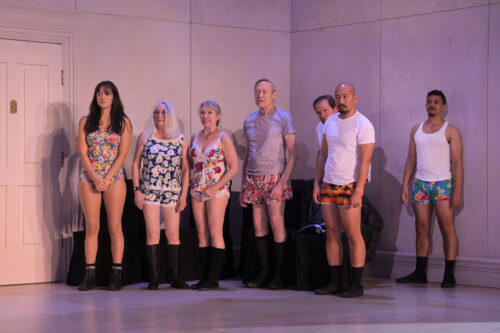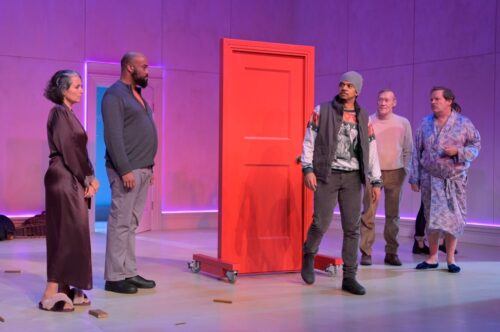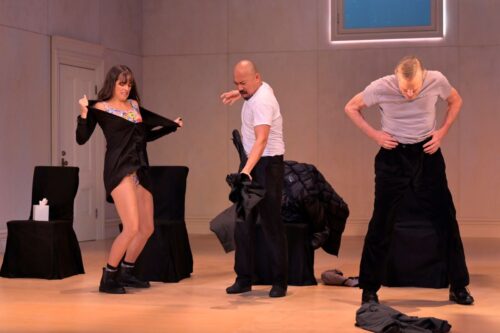A SOLITUDE OF ICICLES
Where to begin.
Wintertime, which brings live theater back to Berkeley Rep, was written by Charles Mee, who has a devoted following among the theatrical cognoscenti, due to his eccentrically witty takes on life, love, and the pursuit of wherever life and love takes the people in his very special and unique world. This play is twenty years old and was a minor triumph in a handful of productions back then, and so it stands to reason that his admirers would want to test the waters and see if the play was ahead of its time and was ready for a new audience. It would be nice to be able to say that it is indeed a neglected masterpiece, but the truth is that it is not. Nowhere near.
The director is Les Waters, who most recently staged Lucas Hnath’s Dana H., one of the most thrilling theatrical productions I’ve seen in the past decade, and, therefore, anticipation was high that he’d be the artist who could resurrect the play. The disappointment is that he hasn’t.
The cast is comprised of some of the best actors I’ve ever seen on the Berkeley Rep stage, who do yeoman work, but who are, unfortunately, asked not to play discernible characters but rather to be spokespersons for Mee’s inner thoughts. And are asked to do so through a variety of styles that are often in opposition to each other.
And with Mee, style is everything. And the mood – exemplified by the constantly falling snow which gives the play’s title its defining focus – is second only to its style. Mee does not make it easy for his directors, which is probably why so many really fine directors are drawn to his work.
The plot, such as there is one, has a handful of characters, who are intricately connected to each other in some complex whirl of unusual relationships, who show up at a summer home in the wintertime, when the house has been closed for the season, thinking they will be alone and finding instead that they have all come to the same place at the same time for different reasons only to be caught up in some vague search for who they are, both in relationship to each other and in relationship to matters that are unrelated to what ties them togetther. They love and then they have recriminations against each other and then they hate each other and they talk and talk until all is talked out, which doesn’t stop them from resorting to acts of physical violence in order to express their “real” feelings. The tone of their repartee is a mishmash of T.S. Eliot and Noel Coward with a dash of Edward Albee’s A DELICATE BALANCE thrown in for spice. But Mee has opera on his mind, too, and arias by the likes of Puccini and Donizetti float around in the ether, and when the chatter stops, the actors engage in monologues which are the equivalent of “arias,” and where Mee’s writing is at its most ferocious and felicitous and ultimately most tiresome. When these arias are at the center, the rest of the cast hangs around in the background, looking a bit lost, as if they wished they could be somewhere else. Anywhere else. As indeed at least one member of the audience did.
There is one stunning moment created by Mee that this reviewer thought was absolutely brilliant in concept and the sort of moment that exemplifies Mee’s greatest strength. At the beginning of the second act, he asks us to sit through an 11 minute aria from Vivaldi’s Farnace, while nobody on stage moves. The demand is that we listen and ruminate. It could have been 11 minutes of overwhelming power considering that a death has taken place moments before the end of the first act and the characters on stage are in mourning. It is in these minutes that Waters’ direction is most distressing. Instead of trusting in Mee’s intention, he has the character of Edmund sob hysterically throughout the aria. I would have gladly sat through the aria in all its length, but the sobbing, which generates hilarious laughter on the part of the audience, becomes less and less amusing after about three minutes (which, in the theater, is a very long time) and takes away from the impact of the music.
Then there is the matter of Annie Smart’s set design. So many set designers have been justifiably inspired by the great Sally Jacobs’ white set that accommodated and clarified Peter Brooks’ vision for his production of A Midsummer Night’s Dream that it sometimes seems less like inspiration and more like imitation, which, in this case, happens to be true. In the script, Mee tells us that the desk and fireplace mantel and the piano are covered in white muslin, which would have suggested a real house, and that the snow even covers the actors instead of just falling gently outside the house, which might have had more symbolic heft. But there is no desk, no fireplace mantel, no piano. Nothing that suggests that reality ever enters this world. Just a white room. With neon-framed doors, the doors there to be slammed every time someone enters or exits in order to suggest “farce” in much the same way as the icicles hanging from the ceiling are interspersed with lighting equipment, presumably to remind us that we are in a “theater” watching a “play.” These were directorial choices with which one could agree or disagree. I think the playwright’s choices were clearer and cleaner.
Anna Oliver’s costumes are bland and undistinguished and provide little insight into the characters, and the robe worn by the character of Francois in the opening scenes is decidedly ill-fitting and unflattering in a very distracting way. He, at least, does a slow shimmy in a red negligee at some point and it’s that more delectable image that stays with one.
I shall mention all the actors because I look forward to seeing each and every one of them under different circumstances – Carmen Berkeley, James Carpenter, Nora El Samahv, Lorri Holt, Sharon Lockwood, Micah Peoples, Thomas Jay Ryan, David Ryan Smith, Jomar Tagatao – and to say that Smith and Lockwood and Ryan and Berkeley have moments that manage to somehow go beyond the script’s pretensions, and that Tagatao, the deus ex machina of each act, by his confidence and naturalness, becomes a recognizable human being.
Perhaps too much time has been spent on some harsh criticism, but, if so, it’s only because I take this play, with all that is wrong with it, very seriously. Mee is an important post-modern writer. In Wintertime, he has perhaps attempted too much, which is preferable to attempting too little. But this production doesn’t do nearly enough to show his true worth.
photos by Kevin Berne
for tickets, visit Berkeley Rep




